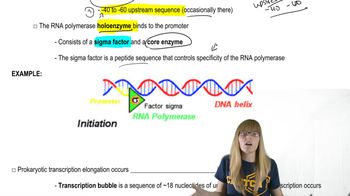- 1. Introduction to Genetics51m
- 2. Mendel's Laws of Inheritance3h 37m
- 3. Extensions to Mendelian Inheritance2h 41m
- 4. Genetic Mapping and Linkage2h 28m
- 5. Genetics of Bacteria and Viruses1h 21m
- 6. Chromosomal Variation1h 48m
- 7. DNA and Chromosome Structure56m
- 8. DNA Replication1h 10m
- 9. Mitosis and Meiosis1h 34m
- 10. Transcription1h 0m
- 11. Translation58m
- 12. Gene Regulation in Prokaryotes1h 19m
- 13. Gene Regulation in Eukaryotes44m
- 14. Genetic Control of Development44m
- 15. Genomes and Genomics1h 50m
- 16. Transposable Elements47m
- 17. Mutation, Repair, and Recombination1h 6m
- 18. Molecular Genetic Tools19m
- 19. Cancer Genetics29m
- 20. Quantitative Genetics1h 26m
- 21. Population Genetics50m
- 22. Evolutionary Genetics29m
17. Mutation, Repair, and Recombination
Types of Mutations
Problem 1d
Textbook Question
Identify the normal functions of the following genes whose mutations are associated with the development of cancer.
p53 (Li–Fraumeni syndrome)
 Verified step by step guidance
Verified step by step guidance1
Understand that p53 is a tumor suppressor gene, which means its normal function is to regulate the cell cycle and prevent uncontrolled cell growth.
Recognize that p53 plays a critical role in maintaining genomic stability by activating DNA repair proteins when DNA has sustained damage.
Note that p53 can initiate apoptosis, the process of programmed cell death, if DNA damage is irreparable, thus preventing the propagation of potentially cancerous cells.
Acknowledge that p53 is often referred to as the 'guardian of the genome' due to its role in preventing mutations and maintaining cellular integrity.
In the context of Li-Fraumeni syndrome, mutations in the p53 gene lead to a loss of its tumor suppressor functions, increasing the risk of developing various types of cancer.
Recommended similar problem, with video answer:
 Verified Solution
Verified SolutionThis video solution was recommended by our tutors as helpful for the problem above
Video duration:
2mPlay a video:
Was this helpful?
Key Concepts
Here are the essential concepts you must grasp in order to answer the question correctly.
Tumor Suppressor Genes
Tumor suppressor genes are crucial for regulating cell growth and preventing uncontrolled cell division. They produce proteins that help repair DNA, control the cell cycle, and initiate apoptosis (programmed cell death) when necessary. Mutations in these genes can lead to a loss of function, allowing cells to proliferate uncontrollably, which is a hallmark of cancer.
Recommended video:
Guided course

Mapping Genes
p53 Protein
The p53 protein, often referred to as the 'guardian of the genome,' plays a vital role in maintaining genomic stability. It responds to cellular stress by activating DNA repair mechanisms, halting the cell cycle, and triggering apoptosis if the damage is irreparable. Mutations in the TP53 gene, which encodes the p53 protein, are commonly found in various cancers, including those associated with Li-Fraumeni syndrome.
Recommended video:
Guided course

Proteins
Li-Fraumeni Syndrome
Li-Fraumeni syndrome is a hereditary condition characterized by a heightened risk of developing multiple types of cancer, often at a young age. It is primarily linked to mutations in the TP53 gene, leading to dysfunctional p53 protein. Individuals with this syndrome have a significantly increased likelihood of cancers such as breast cancer, sarcomas, and brain tumors, making early detection and monitoring essential.
Recommended video:
Guided course

Prokaryotic Transcription

 9:49m
9:49mWatch next
Master Point Mutations with a bite sized video explanation from Kylia Goodner
Start learning



